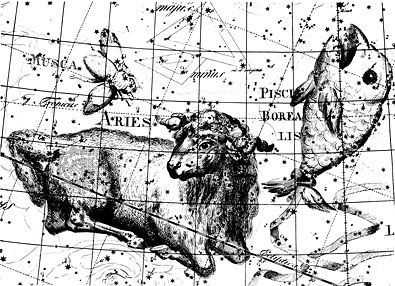Note 26 to the Kitáb-i-Aqdas explains the timing of Naw Rúz as follows:
“Naw-Rúz is the first day of the new year. It coincides with the spring equinox in the northern hemisphere, which usually occurs on 21 March. Bahá’u’lláh explains that this feast day is to be celebrated on whatever day the sun passes into the constellation of Aries (i.e. the vernal equinox), even should this occur one minute before sunset.”
Bahá’ís appear to believe that the Sun enters the constellation Aries at some time on or around the Vernal Equinox. This is not so. It was true about 2500 years ago, but not at present. At this time, the Sun enters Aries on April 19, about four weeks after the Equinox. This is because of something called precession.

One might possibly argue that what Bahá’u’llah really meant was the actual equinox (lit. “equal night”), and that the mention of Aries was only meant to refer to the first month (12th) of the astronomical year, but this argument has a leak: the Bahá’í system of watching for the equinox at some time of day is an impossible system, because the equinox cannot be determined empirically until a 12-hour day has passed, and at that point the equinox may need to be retroactively set to the day before (if the day before was closer to 12 hours).
One could conceivably stand at the equator and watch the sun pass overhead, but the sun passes over the equator at a different place each year. Better be on your toes! Of course, thanks to astronomy, one will know where to look. But there’s a catch:
“The Guardian has stated that the implementation, worldwide, of the law concerning the timing of Naw-Rúz will require the choice of a particular spot on earth which will serve as the standard for the fixing of the time of the spring equinox. He also indicated that the choice of this spot has been left to the decision of the Universal House of Justice.” (note 26)
Okay. Nevermind chasing the sun around the equator.
If one is to pick a single observation point, one had better pick a place not frequented by clouds, fog, dust storms, or mountain ranges. Muslims can tell you all about this problem.
There’s one final thing. The suggestion that a single observation point be selected for the determination of the equinox is, alas, manifestly ignorant of the science. The equinox is a global phenomenon. It does happen at a precise time, but it happens to the entire planet, at the moment that the radius vector of the earth’s orbit is at a right angle to the earth’s axis.
I overlooked a problem with watching the sun cross the equator: it doesn’t work if the equinox occurs at night.